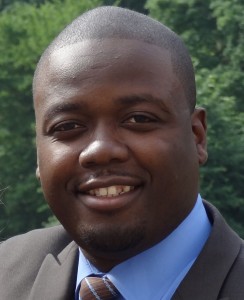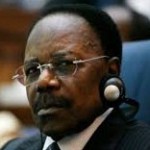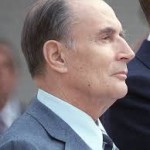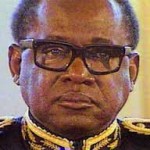The shackles of African neocolonialism
By Samir Salifou

Master of Public Policy candidate at the University of Virginia’s Frank Batten School of Leadership & Public Policy.
Democratization in Sub-Saharan Africa has followed a slow, arduous and sometimes painful path. After achieving independence in the 1960s, most African states have not fully transitioned to democracy. In some instances these states have regressed into colonial-style oppression of their people. Academia has taken several approaches at understanding what went wrong in the African experience. Several theories have been advanced, ranging from political institution theory (which argues the need for formalized rules of the political game), political culture theory (which argues that informal institutions and cultural context are determinants of political outcomes), to political economy theory (which focuses on rational choice and economics as determinants of political outcomes). Yet, in this vast spectrum of theories, we lose focus that in a real world application of politics over people – who are presumed to have consciousness, agency, and intentionality – these theories tend to be endogenous to one another, and all play an important role in regime outcomes.
In this article I focus on the historical context of African independence, in an attempt to understand past failures of the independence process that led to the authoritarian, and often violent, political regimes that took root from the 1960s to the 1990s. To help explain these failures, I start by discussing whether democracy is the proper regime type for Africans to aspire to. I focus my study on the former French colony Gabon, and its continued relationship with its colonial metropolis. I argue that beyond the different theories of political and democratic transitions, international linkage is an endogenous variable to the institutional design that influences African regime outcomes. I will then reject the notion of an African exceptionalism, and show how my argument helps in the understanding that an organic implementation of an institutional framework, in conjunction with the aforementioned theories, will provide the best outcomes for Africa’s nascent democracy.
The available African scholarship discusses development in terms of democratization, and democratic consolidation. It is necessary to first establish whether democracy is the proper regime type for African development. Resembling professors Michel Bratton (Michigan State University) and Nicolas van de Walle’s (Cornell University) definition, I define democracy as “a form of political regime in which citizens choose, in competitive elections, the occupants of the top political offices of the state.”i This definition presupposes political liberalization to insure that democracy is free, fair and follows a set of pre-established rules that are institutionalized over time through constitutional constraints. Democracy for the sake of legitimacy is important for the elected class to have a mantel of authority in making policy decisions. Yet, democracy for the sake of holding the elected class accountable is even more important for citizens of African nations who aspire to self-determination as much as Europeans, Asians, or Latin Americans.
This definition of representative democracy is not to be misconstrued as being an endorsement of direct democracy. Direct democracy – the Athenian model – is analogous to mob rule. The political philosopher Colin Bird highlights the dangers of direct democracy by comparing it to the reason why “we do not have passengers on aeroplanes vote on how they are to be flown, or patients vote on the medical treatments each should receive.”ii Condorcet’s Paradox, which speaks to the downfalls of majority rule voting, highlights another peril of direct democracy. Condorcet, an 18th century mathematician and philosopher, found that individual, complete and transitive preference ordering does not necessarily lead to collective transitive preference ordering. In other words, majority-rule direct democracy can lead to a chaotic and unstable government where individual rational preferences may drive to collective gridlock.iii This effect may be remedied by considering Nobel Prize winning economist Kenneth Arrow’s impossibility theorem, which suggests that strong institutions are needed to mitigate the downsides of democratic collapse while maintaining the upsides of democratic constraint.
As defined herein, democratic states hold certain advantages over authoritarian states insofar as leaders are accountable to a broad electorate. They also tend to understand that violence and war are suboptimal resolutions to international relations, and to the relationship between the state and its citizens. Democratically-elected leaders that follow a democratically-inclusive institutional design benefit from a broader-reaching developmental state that has higher infrastructural power because of legitimacy. While it is important to not reify democracy, it is equally important to understand the power that democracy wields in legitimizing political action by holding elected officials accountable through periodic elections.
Why then has Africa had such a hard time establishing the proper institutional design conducive to democratization? It is tempting to identify a panacea, but as with most dilemmas in the social sciences, the answer is multi-dimensional. Looking at Gabon – an oil rich former French colony – as a case study, we can better understand the role international linkage plays as an endogenous variable to the lack of inclusive institutions.

Leon M’ba
On August 17, 1960, the Republic of Gabon received its independence from its colonial metropolis, France. As in most newly-independent African countries at that time, with independence came the hopes of liberty and self-determination. This zeitgeist was exemplified in a speech that the former Guinean President, Ahmed Sékou Touré, delivered in front of former French President Charles De Gaulle on August 25, 1958. “There is no dignity without liberty; we prefer poverty in liberty, than wealth in slavery,” iv Touré said. The new era of independence was seen as a chance for Africa to grow to its full potential, given its immense wealth in natural resources. While Gabon was known for its logging export, it would soon realize that it was also sitting on massive oil reserves. The first president of Gabon, Leon M’ba, was a part of the new Pan-African ruling class that saw an alliance with France as being in the best interests of his new country; these leaders included Felix Houphouet-Boigny and Léopold Sédar Senghor. This African desire for economic integration with France was advantageous to the French who had just conceded to the Algerians after a bloody war, leaving them without a reliable source of oil. Gabon, with its large reserves, became the largest supplier of oil to France.v This relationship between France and its former colonies has been dubbed “Françafrique”, and has been said to be partly responsible for the lack of democratization across French-speaking Africa.
By the same author: http://sws2.xrto.net/as-president-obama-takes-us-to-the-mountaintop/
The term Françafrique, since its original pronunciation by Felix Houphouet-Boigny, has earned a nefarious connotation as a form of exploitative neocolonialism. Yet, the question that must be asked is whether Françafrique is any different from an innocuous form of hegemonic stability theory, creating an economic relationship between Gabon and France. The answer to this question highlights the role that international linkage has played in destabilizing African agency, and in being a hindrance for organic and inclusive institutional design. Several primary sources such as Maurice Delauney, French Ambassador to Gabon during independence, and Loïk Le Floch-Prigent, former CEO of the French national oil company Elf Aquitaine, have attested to Françafrique being a neocolonial relationship.

Felix Houphouet-Boigny
Loïk Le Floch-Prigent, former CEO of Elf, has said that France’s primary national security interest was in having a stable source of oil imports. He describes this bilateral relationship by saying that “from the time it took to discover oil and extract it from the ground it could have been up to 7 years … it was in France’s interest to maintain stability in Gabon by making sure that there wasn’t [frequent] government turnover”vi. This statement – coming from the person who was in charge of France’s energy policy as it pertains to oil – is an indicator of the relationship that ensued between the two nations. In 1963, Gabon’s President M’ba decided to consolidate his power in Gabon by instituting measures such as a single-party system, and reducing the number of members of parliament from 67 to 47.vii This arbitrary change in the rules of the political game in Gabon was the catalyst to a nonviolent coup that took place on February 18, 1964. Within 24 hours French troops re-established the M’ba governmentviii, despite that government’s anti-democratic institutional changes. Because M’ba had taken away the capacity for opposition parties to air their grievances through a formalized political process, the opposition did so through force. Yet, this organic movement was not able to change the political system or establish a formalized structure for the political process because of French interference.
After the coup of 1964, the French wanted to make sure that they could better protect their investments in Gabon by stabilizing the political climate. Maurice Delauney, former French Ambassador to Gabon, discussed in an interview the role that France played in the transition of power that occurred in Gabon in 1967. Knowing that President Leon M’ba was ill, Ambassador Delauney said:
“When we, Mr. Foccart and I, saw that President M’ba’s health was failing, Mr. Foccart had the good idea to request that President M’ba reform the constitution to incorporate an elected Vice President who would succeed the President in the event of his death. We then staged a ceremony at the Gabonese embassy in France to make it official … From that time forward there was a Vice President who was Bongo. When M’ba died Bongo become the President of the Republic, which allowed us [France] to avoid a difficult transition.”ix

El-hadj Omar Bongo
In this interview, Ambassador Delauney was referring to Jacque Foccart, Secretary-General of the French Communityx and President de Gaulle’s advisor on African and Malagasy affairs.xi After President M’ba’s death on November 27, 1967, he was succeeded by his Vice President, Omar Bongo, who served as president for over 41 years, with the support of the French government and its military. Ambassador Delauney’s comments showcase the manner in which French interference into the sovereign affairs of its former colonies was a burden on African democratic institutional design. African leaders no longer had an incentive to acquire the political legitimacy discussed above through democratization because they could wield their power with impunity. President Bongo’s depiction of this relationship is telling; he says that “Gabon without France is like a car with no driver. France without Gabon is like a car with no fuel.”xii Unfortunately, for the analogy to hold true, it would be necessary to add that the car either left the citizens of Gabon behind or was recklessly running over their political agency.
By the same author: http://sws2.xrto.net/a-campaign-of-wild-emotions/
Understanding why Africa has had such a hard time at democratization can help to dismiss certain claims of an African exceptionalism. The idea behind this exceptionalism has been that the salience of African culture and patronage is a barrier to effective state building. University of Florida Professor Goran Hyden, has said that Africa relies on what he calls “an economy of affection.”xiv He further says that “in the absence of a welfare state set of institutions aimed at providing citizens with a measure of social security, Africans have always relied on informal social support systems such as the extended family, neighbors, or community at large.”xv Hyden’s claim is that the economy of affection “rests on communal rather than collective action in that persons band together not as autonomous individuals trying to achieve a common goal, but as people interdependent on each other and anxious to satisfy each other’s sense of fairness.”xvi Granted, African culture is unique and has evolved through tribes that form villages, but it would be difficult to discount the endogenous role that factors such as the Cold War and Françafrique have played in blocking formal institutional design. The fact that several African countries experienced political coups during times of single party regimes is an indication that state-building in Africa is not undermined by African culture, but by the lack of a formal and inclusive electoral process. That electoral process, in turn, is undermined by external actors who influence electoral outcomes, and change constitutional rules in the manner in which Ambassador Delauney described above. The existence of the rule of law is undercut in these cases because the incentive structures for politicians to adhere to any rules are geared toward external forces (e.g. France) and not internal forces (e.g. the indigenous citizenry). Because of this imbalance in the incentive structures, I reject the notion of an African exceptionalism.

Francois Mitterrand
How can we expect Africa to transition from its autocratic past to a democratic future that should be conducive to development? Thankfully, after the fall of the Berlin Wall, the international dynamics of hegemony changed. Western nations could no longer turn a blind eye to the excesses of autocratic leaders. On June 20, 1990 the traditional French-Africa Summit was held at La Boule, France where French President Francois Mitterrand announced that French aid would, going forward, be conditional on democratization and political liberalization.xvii In Gabon, just like in other French speaking African countries, this sparked a chain of events that led to several national conferences where citizens and elites forged new constitutions and started the practice of political liberalization. University of Wisconsin Professor Aili Mari Tripp points to the fact that “since the 1990s, there has been a general shift toward political liberalization and democratization in Africa, with an increase in civilian led regimes.”xviii This phenomenon stresses the role international linkage played in maintaining undemocratic structures within African authoritarian regimes prior to 1990.
Regrettably, the national conference process has not led to complete democratic consolidation across Africa, but it has led to what Professor Tripp calls “hybrid regimes”xix throughout the continent. These hybrid regimes are characterized as having the elements of political liberalization (e.g. multiparty systems, a free press) without having the proper inclusive institutional design to allow for political turnover.xx Dr. Tripp highlights that authoritarian regimes are disappearing, with “two thirds [of African states] moving out of this category from 1990 to 2008 and the remaining eleven experiencing political reforms.”xxi Since the process of democratic consolidation is not necessarily linear and can take several generations to fully take hold, these hybrid transitions are an encouraging sign. Professor Tripp accentuates this point:
“Democratic regimes in Africa have generally emerged from countries that had already instituted multipartyism [sic] and introduced a good measure of civil liberties and political rights. This suggests that hybrid regimes can provide important stepping stones to further democratization in Africa, as has been the case in other parts of the world, where countries with improved civil liberties created favorable conditions for transitions to democracy.”xxii
This hope for African democratization is not one that is rooted in blind optimism but one that is forged from past experiences with democratic consolidation, while taking into account the reduced influence of Françafrique.
Based on the analysis laid out thus far, it is safe to say that Africa has undergone two stages of independence. The first occurred in the 1960s with the departure of the colonial governments, even though the colonial regimes were maintained. The second occurred in the 1990s after the fall of the Berlin Wall. This second independence has seen a changing of the guards. It has been a rupture between the past regimes that maintained an oppressive and sometimes bloody grip on power, to new hybrid regimes. The next step in this transition is one that requires these semi-authoritarian regimes to create the proper incentives for their leaders to step down and not have to hold on to power for the sake of their livelihood or freedom. This form of rational choice theory was addressed by Aili Tripp who talks about a catch-22 power imperative. This theory states that leaders of semi-authoritarian regimes have had to resort to violence and patronage in past ventures while ascending to power, and thus will allow political liberalization only to the extent that it will not cause them to be removed from power because of a fear of reprisal.xxiii However, this step in the process inevitably leads to an issue of credible commitment. Would African legislatures be willing to negotiate a way out for leaders such as Museveni of Uganda, or Obiang of Equatorial Guinea? Would these rulers have enough faith in this system, if it were implemented? If these questions cannot be answered in the affirmative, power becomes a cycle where coercive force and exclusive institutions perpetuate strong-man rule.
If the conditions are properly set for African institutions to be inclusive and the electoral processes to be free and fair, then there is no reason why Africa cannot have an organic institutional design that takes into account the cultural contexts that surround Africa while holding certain universal principles of democracy intact. Principles such as multiparty systems (to allow for political grievances and not political movements), the rule of law through constitutional constraints with an independent and strong judiciary, a legislature that is accountable to its citizens, and an executive officer that is constrained by the political process but has a mantel of authority through the legitimacy of elected office. With the retreat of neocolonialism, Africa stands a good chance at being able to set the stage for these prerequisites to be met. Once those conditions are met, policymaking should be conducive to economic development that benefits the masses and not just a few elites.

Understanding the powerful force of democratization as a source of organic power for African political agency and self-determination, is the foundation to understanding the setbacks that African countries have had with development. In the recent past – from the 1960s to the 1990s – the role that African citizens played in political outcomes was burdened by international events such as the Cold War and Françafrique. These events shifted the incentive structures for African leaders from needing to produce economically-sound policy for their citizens to needing to produce the best cooperation with external actors that would help propagate their regimes. As we have seen with Gabon, this allowed for Omar Bongo to stay in power for over 41 years, not unlike other leaders such as Eyadema in Togo, and Mobutu in Zaire, who were in power respectively 38xxiv and 32xxv years. The second wave of African independence has allowed for the emergence of hybrid regimes that have been more democratic, but have not achieved full political liberalization. Yet, based on past examples of democratic transition, democratization is an incremental process. The political scientists Bratton and van de Walle have found through regression analysis that “regimes are shaped by the institutional legacy of preceding political regimes.”xxvi Ultimately, African development and democratization will occur according to the desires and the will of the African people. With the proper policies and political incentives in place, the future of Africa’s prosperity will play an encouraging role for mankind as it did in its past capacity as the cradle of humanity.
__________________________________________________________
iMichael Bratton and Nicolas van de Walle, Democratic Experiments in Africa: Regime Transitions in Comparative Perspective (New York, NY: Cambridge University Press, 1997),13.
iiColin Bird, An Introduction to Political Philosophy, 3rd ed. (Cambridge, UK: University Press, 2010), 210
iiiDavid Waldner, “Democracy” (lecture, Nau Hall 101, University of Virginia, Charlottesville, VA, October 16, 2013).
ivFrançafrique la Raison d’état, directed by Patrick Benquet, narrated by Volodia Serre, Compagnie des Phares et Balises, 2010, Translated by the author.
vIbid.
viIbid.
viiMichigan State University, “Gabon: History,” Global Edge, accessed April 18, 2014, http://globaledge.msu.edu/countries/gabon/history.
viiiIbid.
ixFrançafrique la Raison d’état, directed by Patrick Benquet, narrated by Volodia Serre, Compagnie des Phares et Balises, Translated by, 2010, translated by the author.
xCraig R. Whitney, “Jacques Foccart Dies at 83; Secret Mastermind in Africa,” The New York Times, March 20, 1997, sec. World, http://www.nytimes.com/1997/03/20/world/jacques-foccart-dies-at-83-secret-mastermind-in-africa.html.
xiDouglas Johnson, “Obituary: Jacques Foccart,” The Independent, accessed April 18, 2014, http://www.independent.co.uk/news/people/obituary-jacques-foccart-1273923.html.
xii“The Corrupt Nepotist Who Ruled Gabon for 40 Years,” The Independent, accessed April 18, 2014, http://www.independent.co.uk/news/world/africa/the-corrupt-nepotist-who-ruled-gabon-for-40-years-1700197.html.
xiiiCrawford Young, The African Colonial State in Comparative Perspective(New Haven, CT: Yale University Press, 1994), 283.
xivGoran Hyden, African Politics in Comparative Perspective (New York, NY: Cambridge University Press, 2006), 73.
xvIbid, 88.
xviIbid, 93.
xviiRiding, Alan. “France Ties Africa Aid to Democracy.” The New York Times, June 22, 1990, sec. World. http://www.nytimes.com/1990/06/22/world/france-ties-africa-aid-to-democracy.html.
xviiiAili Mari Tripp, Museveni’s Uganda: Paradoxes of Power in a Hybrid Regime (Boulder, CO: Lynne Rienner Publishers, 2010), 16.
xixIbid, 16.
xxIbid, 13.
xxiIbid, 22.
xxiiIbid, 19.
xxiiiIbid, 24.
xxivReuters, “Gnassingbe Eyadema, Togo’s Ruler, Dies at 69,” The New York Times, February 6, 2005, sec. International / Africa, http://www.nytimes.com/2005/02/06/international/africa/06eyadema.html.
xxvHoward W. French, “Mobutu Gives Up, Leaving Kinshasa and Ceding Power,” The New York Times, May 17, 1997, sec. World, http://www.nytimes.com/1997/05/17/world/mobutu-gives-up-leaving-kinshasa-and-ceding-power.html.
xxviMichael Bratton and Nicolas van de Walle, Democratic Experiments in Africa: Regime Transitions in Comparative Perspective (New York, NY: Cambridge University Press, 1997),139.


